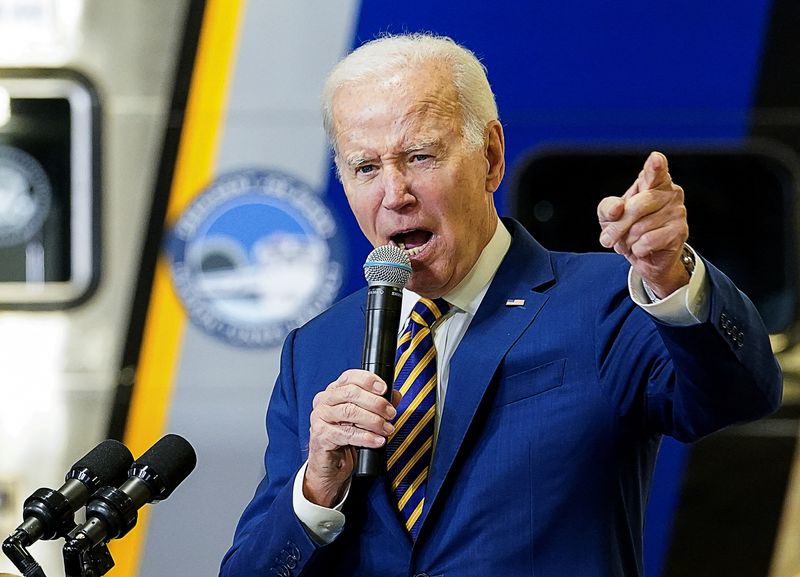(Refiles to remove extraneous words in paragraph 17)
By Jarrett Renshaw
PHILADELPHIA (Reuters) -President Joe Biden's plan to reshape the Democratic Party's presidential nominating contest faces its final test this week in a Democratic National Committee vote where officials from two key states staunchly oppose the effort.
Biden wants the DNC to oust Iowa as the first in the nation in the party's nominating calendar - a position it has held since 1972 - and replace it with South Carolina, a state with significantly more Black voters, and one that saved his 2020 presidential campaign.
South Carolina would be followed by New Hampshire and Nevada one week later, and then by primaries in Georgia and Michigan.
The planned promotion of South Carolina and Georgia reflects a demographic balancing decades in the making for the Democratic Party at the expense of two largely white states that rejected him in 2020. It underscores the growing power of the racially diverse coalition that helped bring Biden to power.
The move, another clear sign Biden intends to run for re-election in 2024, would force any potential Democratic primary challenger to square off with Biden in a series of matchups largely of his choosing.
The plan is expected to get overwhelming support from the 483 voting members on Saturday after DNC leadership spent the last couple weeks whipping votes to ensure a strong showing of support for Biden, according to interviews with a dozen members and senior leaders.
Just a simple majority of the members need to approve it, but two states, Georgia and New Hampshire, are not playing along and have been given to June to comply. Their opposition to the revamp, which needs approval from states' Republican parties too, complicates Democrats' plans for a smooth coronation for Biden as the 2024 candidate.
Possible repercussions are likely to be a key topic as the DNC gathers in Philadelphia for a three-day conference starting Thursday, as is where Democrats will hold their 2024 convention. Biden will address the conference Friday.
Democrats privately concede that neither Georgia nor New Hampshire's state officials are likely to budge, and some say the party should consider other options.
"If not Georgia, who?," one voting member asked rhetorically. "We need to ask ourselves 'Are we OK with South Carolina, and Michigan deciding our presidential nominations?'"
GRANITE STATE
Biden's push to move New Hampshire down the primary calendar has struck a nerve with both Republicans and Democrats in the Granite State.
New Hampshire has been the first primary in the nation since 1920 and its place on the calendar is ingrained into state laws. Strictly speaking, Iowa's nominating contest is not a primary, but a voting process known as caucuses.
New Hampshire Democratic Senators Jeanne Shaheen and Maggie Hassan sat out the White House congressional ball in December amid anger over the potential changes.
Former House Speaker Steve Shurtleff, one of the state's four Biden electors in 2020, signed a letter urging Biden to rethink the plans and told a local television station he's willing to go even further.
"I'll look for another candidate before I support Joe Biden if he should go so far as to take away the first-in-the-nation primary from the Granite State," he said. Republicans control state government, so Democrats, even if they wanted to, lack the authority to move the calendar without the help from the rival party. Iowa Democrats are also likely to move ahead with its early caucus over the national party's objections, inviting similar penalties.
In Georgia, Democrats want to move up the calendar but need Republicans who control state government to agree. Georgia Gov. Brian Kemp and Secretary of State Brad Raffensperger - both Republicans - have shown no appetite to buck their national party and move up the calendar.

That's disappointing to state Democrats, who believe Georgia has earned the right to a top spot, after electoral victories that gave the party a majority in the U.S. Senate.
"Georgia has been the MVP of national politics for the last three years. All of the party’s legislative successes can be traced directly back to Georgia," said Van Johnson, mayor of Savannah and a Georgia DNC delegate.